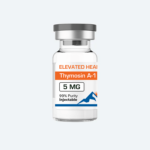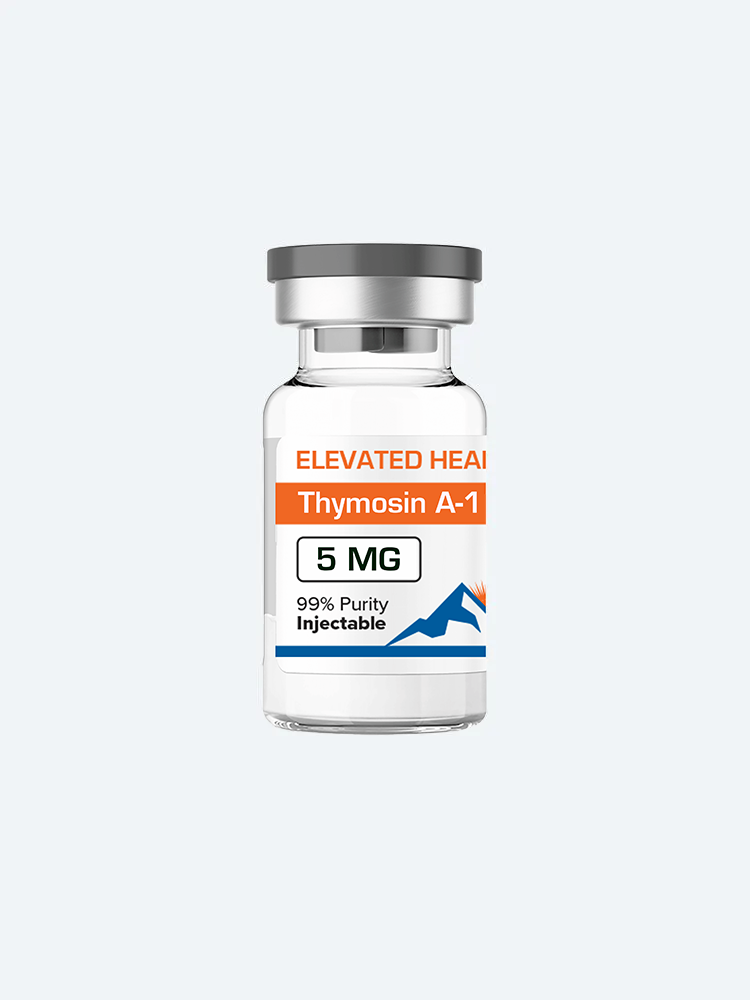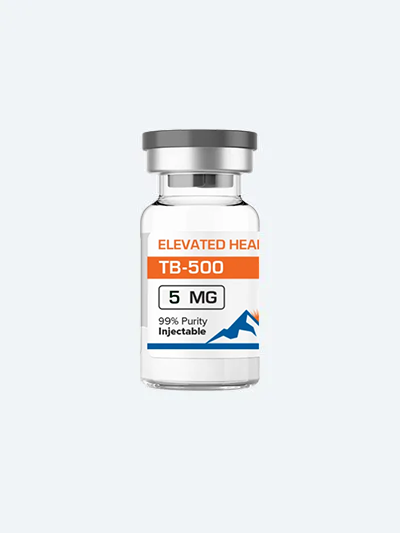No products in the cart.
Back



Thymosin Alpha-1
$80.00

In stock
Thymosin Alpha-1
Anti-Cancer, Anti-oxidant, Anti-Viral, Immune Boosting, Peptides, Repair and Recovery$80.00
SKU: 29045-SB-9-56
5mg Injectable
Ingredients – 5 mg Thymosin Alpha-1 Peptide
Indications – Immune modulator, anti-viral, anti-bacterial, Lyme disease, anti-cancer
Dosage – 500-1000 mcgs daily via injection or nasal spray
Thymosin alpha-1 was first discovered in 1972, isolated from tissue of the thymus gland. Thymosin alpha 1 is a powerful immune function modulator that plays a crucial role in restoring and regulating the immune system. This peptide has been widely studied for its ability to enhance T-cell function, restore immune homeostasis, and protect the body from oxidative stress, and possesses powerful antibacterial and antiviral properties. It has since been studied for cystic fibrosis, infection (e.g. tuberculosis, cytomegalovirus), respiratory disorders, chronic hepatitis, and cancer.
Thymosin Alpha-1 helps regulate both innate and adaptive immune responses. This modulation of the immune system ensures that the body has the ability to fight off harmful pathogens while preventing overactive immune responses that can lead to autoimmune conditions.
- Description
Thymosin Alpha 1:
Thymosin Alpha-1’s ability to enhance immune function and reduce oxidative stress makes it a valuable tool for improving overall health and protecting the body from serious health conditions.
Thymosin alpha 1 has been utilized in the treatment of immunocompromised states and malignancies, and as a means of curbing morbidity and mortality in sepsis and numerous infections. Studies have shown that thymosin alpha 1 could help improve the outcome in severely ill corona virus disease 2019 patients by repairing damage caused by overactivation of lymphocytic immunity and how thymosin alpha 1 could prevent the excessive activation of T cells.
It has additionally been of value in treating oncologic patients, especially those with hepatocellular carcinoma, renal cell carcinoma and non-small cell lung cancer. Last but not least, it has been used in the fight of numerous infections, such as human immunodeficiency virus (HIV), pseudomonas, and mold toxicity, and sepsis.
Thymosin Alpha-1 Peptide and Immune System
Thymosin Alpha-1 works by modulating the immune system and enhancing T-cell function. As a senolytic agent and senomodulator, Thymosin Alpha-1 helps eliminate damaged or dysfunctional cells, while also regulating immune responses to ensure that the body can effectively fight off infections. This peptide enhances T-cell function by enhancing the ability of T-cells to recognize and destroy harmful pathogens.
Research in mice without thymus glands shows that thymosin alpha-1 alone is enough to restore immune function and prevent widespread infection. The peptide works at the most fal levels or the immune svstem to activate signaling painwavs and stimulate the production of cytokines and other molecules that her to coordinate the activities of various cells in the immune system. In other words, thymosin alpha-1 has broad, positive effects on the immune svstem.
Thymosin Alpha-1 Peptide and Oxidative Stress
In addition to its role in immune modulation, Thymosin Alpha-1 also provides protection against oxidative stress. Oxidative stress occurs when there is an imbalance between the production of reactive oxygen species (ROS) and the body’s ability to neutralize them. Thymosin Alpha-1 acts as an antioxidant, reducing oxidative damage and protecting cells from premature death. This process helps protect the body from the damaging effects of chronic inflammation, which can contribute to the progression of diseases like cancer, respiratory disorders, and chronic fatigue.
Thymosin Alpha-1 and Cancer Cells
Research using human lung cancer cells (A549) indicates that thymosin alpha-1 has anti proliferative effects, reducing both the growth and metastasis of cancerous cells. The peptide also appears to reduce cell migration, which can help to reduce penetration of cancer cells into surrounding tissue (i.e. invasion)
Research combining thvmosin alpha-1 with dacarbazine. a common chemotherapv showed an increase in progression-free survival rates and no increase in rates of toxicity. This indicates that thymosin alpha-1 boosts the effects of the chemotherapy in reducing cell proliferation.
Thymosin alpha-1 has been tested and is undergoing active testing in a number of different cancers. Positive results have been seen in:
- Breast Cancer
- Melanoma
- Liver Cancer
- Lung Cancer and
- Colon Cancer
Thymosin Alpha-1 Promotes Nerve Growth
The immune system plavs verv important roles in the arowth. develonment. and maintenance of the central nervous system, particularly the brains of developing mammals. Research in mice indicates thymosin alpha-1 is a prominent potentiator of neurodevelopment and that peripheral administration of the peptide can actually boost cognitive function. It appears that thymosin alpha-1 affects a number of genes responsible for neuron growth and the development connections between neurons. The peptide alters the environment within the nervous system to favor growth and develor while simultaneously blocking pathways responsible for inflammation and neuron dysfunction[4]. In short, thymosin alpha-1 actually improves brain structure and function.
There is interest in using the molecule to address neurodevelopmental delays, such as those associated with cerebral palsy.
Thymosin Alpha-1 Research and Inflammatory Pain
Inflammatory pain is transmitted through specific pathways in the peripheral and central nervous system. Given the strong anti-inflammatory effects of thymosin alpha-1, scientists speculated that the molecule could effectively reduce pain as well. Research in mice suggests that this is indeed true and has even identified the specific pathways that thymosin alpha-1 interferes with. It turns out that thymosin alpha-1 acts directly at the sight of inflammation to reduce the production of cytokines and other molecules (e.g. TNF-alpha, IL-1beta, etc.) that trigger pain in the first place[16]. This mechanism of action is drastically different from typical anti-inflammatory pain relievers and may offer improved pain relief with fewer side effects than existing drugs
Thymosin Alpha-1 and Cystic Fibrosis
One of the primary complications of cystic fibrosis (CF) is rampant inflammation that leads to poor mucous clearance, increased rates of infection, and other problems. All of these problems stem from a mis-folding of a specific protein called CFTR. Research indicates that thymosin alpha-1 can reduce inflammation and even improve function of the CFTR protein[7]. There is hope that the peptide may offer an effective single-molecule therapeutic approach to treating CF.
Thymosin Alpha-1 Peptide and Hepatitis
Thymosin alpha-1 is an effective and highly affordable treatment against chronic hepatitis R and C infections It is alco an effective immune stimulant. Thymosin alpha-1 is currently approved for treatment of hepatitis B and C in over 35 different countries.
Clinical trials were conducted in test subjects with liver complications, subjects exhibiting Hepatitis B, reported to the research team that when these subjects were presented with Thymosin Alpha-1 twice a week for the duration of the study, the reported virological response rate of the subjects appeared increased by 40.6%. For Hepatitis C, subjects reportedly exhibited improved results when Tα 1 was present in combination with interferon alpha compounds.
Such modulation is crucial not just for combating infections but also for controlling inflammatory responses, potentially benefiting chronic hepatitis and acute pancreatitis due to its apparent actions on cytokine profiles. In murine models and in vitro studies, Thymosin alpha-1 has been shown to possibly stimulate T-cell maturation and enhance the efficacy of natural killer cells. It might also play a role in reducing inflammatory cytokines such as tumor necrosis factor-alpha, which could be particularly beneficial in chronic inflammatory models.
Thymosin Alpha-1 Peptide and Sepsis
In a 2015 study, a meta-analysis was conducted where all the relevant clinical trials prior to 2014 were analyzed to understand the possible mechanism of Thymosin Alpha-1 in relation to the sepsis reaction. In this study, 12 controlled trials were evaluated in total. Based on the extracted data and assessment, it was observed by the research analysts that there was a reported significant decline in mortality rate amongst test subjects following introduction to Thymosin Alpha-1.
References
Immunodeficiency, British Society for Immunology. Published March 2017. https://www.immunology.org/policy-and-public-affairs/briefings-and-position-statements/immunodeficiency
Primary Immune Deficiency Diseases. https://www.niaid.nih.gov/diseases-conditions/primary-immune-deficiency-diseases-pidds
Dominari A, Hathaway Iii D, Pandav K, Matos W, Biswas S, Reddy G, Thevuthasan S, Khan MA, Mathew A, Makkar SS, Zaidi M, Fahem MMM, Beas R, Castaneda V, Paul T, Halpern J, Baralt D. Thymosin alpha 1: A comprehensive review of the literature. World J Virol. 2020 Dec 15;9(5):67-78. doi: 10.5501/wjv.v9.i5.67. PMID: 33362999; PMCID: PMC7747025. https://www.ncbi.nlm.nih.gov/pmc/articles/PMC7747025/
National Center for Biotechnology Information. “PubChem Compound Summary for CID 16130571, Thymalfasin” PubChem, https://pubchem.ncbi.nlm.nih.gov/compound/Thymalfasin
Garaci E. Thymosin alpha1: a historical overview. Ann N Y Acad Sci. 2007 Sep;1112:14-20. doi: 10.1196/annals.1415.039. Epub 2007 Jun 13. PMID: 17567941. https://pubmed.ncbi.nlm.nih.gov/17567941/
Eckert K, Schmitt M, Garbin F, Wahn U, Maurer HR. Thymosin alpha 1 effects, in vitro, on lymphokine-activated killer cells from patients with primary immunodeficiencies: preliminary results. Int J Immunopharmacol. 1994 Dec;16(12):1019-25. doi: 10.1016/0192-0561(94)90081-7. PMID: 7705963. https://pubmed.ncbi.nlm.nih.gov/7705963/
Li C, Bo L, Liu Q, Jin F. Thymosin alpha1 based immunomodulatory therapy for sepsis: a systematic review and meta-analysis. Int J Infect Dis. 2015 Apr;33:90-6. doi: 10.1016/j.ijid.2014.12.032. Epub 2014 Dec 19. PMID: 25532482. https://pubmed.ncbi.nlm.nih.gov/25532482/
Chadwick D, Pido-Lopez J, Pires A, Imami N, Gotch F, Villacian JS, Ravindran S, Paton NI. A pilot study of the safety and efficacy of thymosin alpha 1 in augmenting immune reconstitution in HIV-infected patients with low CD4 counts taking highly active antiretroviral therapy. Clin Exp Immunol. 2003 Dec;134(3):477-81. doi: 10.1111/j.1365-2249.2003.02331.x. PMID: 14632754; PMCID: PMC1808897. https://www.ncbi.nlm.nih.gov/pmc/articles/PMC1808897/
Qin Y, Chen FD, Zhou L, Gong XG, Han QF. Proliferative and anti-proliferative effects of thymosin alpha1 on cells are associated with manipulation of cellular ROS levels. Chem Biol Interact. 2009 Aug 14;180(3):383-8. doi: 10.1016/j.cbi.2009.05.006. Epub 2009 May 12. PMID: 19442654. https://pubmed.ncbi.nlm.nih.gov/19442654/
Kharazmi-Khorassani J, Asoodeh A. Thymosin alpha-1; a natural peptide inhibits cellular proliferation, cell migration, the level of reactive oxygen species and promotes the activity of antioxidant enzymes in human lung epithelial adenocarcinoma cell line (A549). Environ Toxicol. 2019 Aug;34(8):941-949. doi: 10.1002/tox.22765. Epub 2019 May 8. PMID: 31067016.
Zadaxin (Thymalfasin): Uses, Dosage, Side Effects, Interactions, Warning [Internet]. RxList. 2009. [cited 2020 September 27]. Available from: https://www.rxlist.com/zadaxin-drug.htm#description .
Li J, Liu CH, Wang FS. Thymosin alpha 1: biological activities, applications and genetic engineering production. Peptides. 2010;31:2151–2158. doi: 10.1016/j.peptides.2010.07.026.
Antachopoulos C, Katragkou A, Roilides E. Immunotherapy against invasive mold infections. Immunotherapy. 2012;4:107–120. doi: 10.2217/imt.11.159.
Li C, Bo L, Liu Q, Jin F. Thymosin alpha1 based immunomodulatory therapy for sepsis: a systematic review and meta-analysis. Int J Infect Dis. 2015;33:90–96. doi: 10.1016/j.ijid.2014.12.032.
Romani L, Tomino C, Puccetti P, Garaci E. Off-label therapy targeting pathogenic inflammation in COVID-19. Cell Death Discov. 2020;6:49. doi: 10.1038/s41420-020-0283-2.
REMINDER TO ALL CUSTOMERS:
Due to their sensitive nature and strict storage requirements: all sales are final on peptides & GH products. We cannot accept returns strictly because of product integrity and safety for all clients. Thank you for your understanding
Related products
- Elevated’s Immunity Boosting Bundle
$354.00Original price was: $354.00.$269.00Current price is: $269.00. - TB-500, 5mg$78.00
- AOD-9604, 5mg, 3 Pack
$240.00Original price was: $240.00.$216.00Current price is: $216.00.





